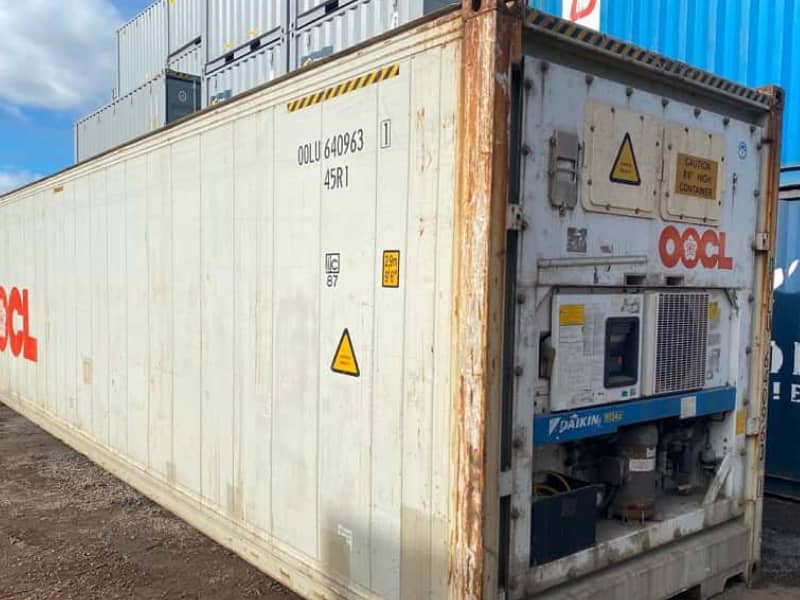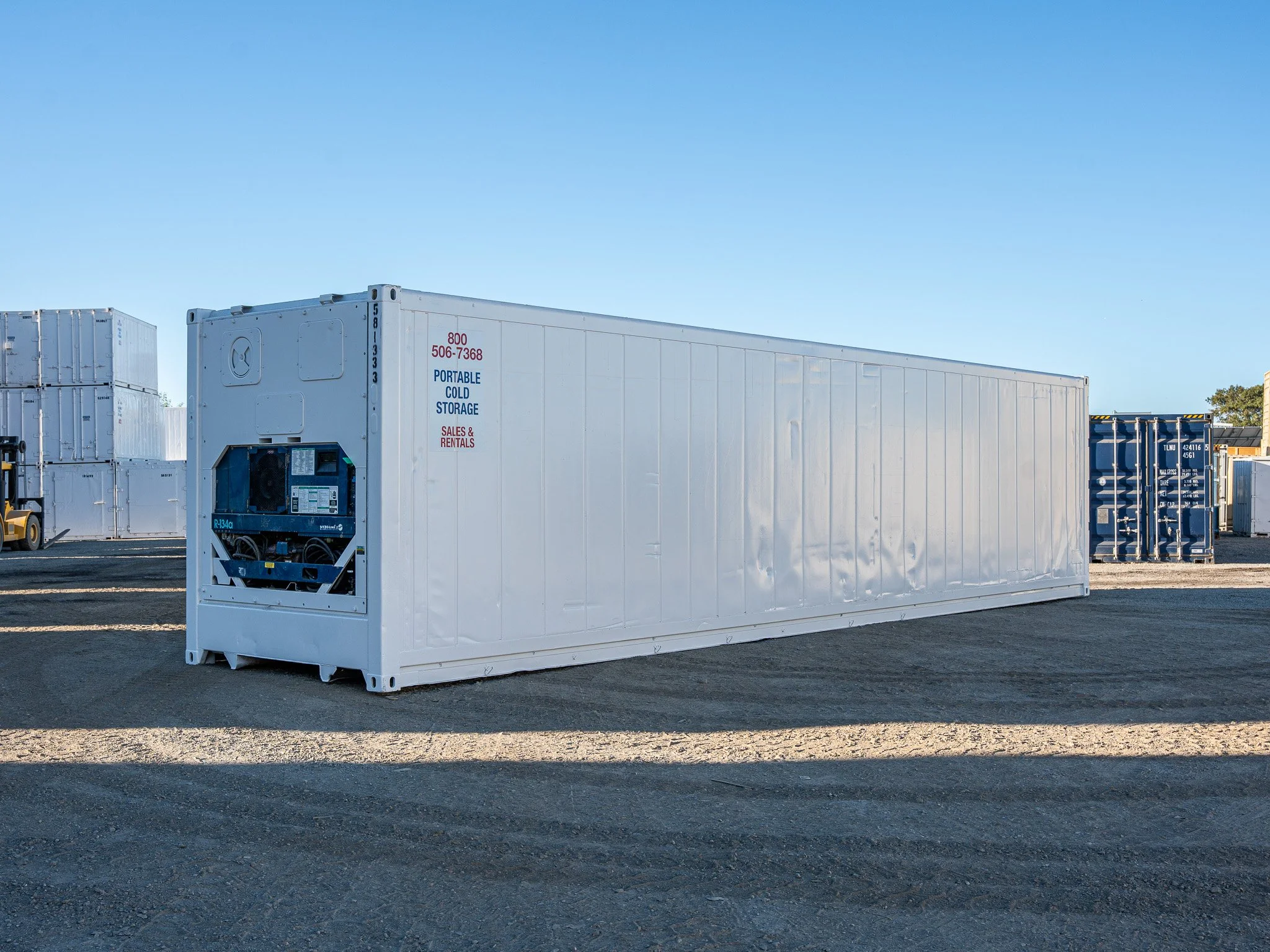Invest in affordable used 40ft refrigerated shipping containers for storage
All About Freezer Containers: Essential Insights for Your Storage Space Needs
Cold storage containers play a crucial role in the conservation of perishable goods. They are available in various forms, including refrigerated and protected systems, each made for details storage demands. Understanding the benefits and key functions of these containers is vital for organizations aiming to optimize their procedures. As the need for reliable storage solutions expands, exploring the various choices readily available can result in notified decisions that affect both productivity and sustainability. What variables should one take into consideration when choosing the best container?
Kinds of Freezer Containers
Cold store containers been available in numerous kinds, each created to meet particular temperature control needs. Amongst one of the most typical types are cooled containers, which maintain temperature levels between 0 ° C to 10 ° C, making them ideal for disposable items like fruits, vegetables, and dairy items. An additional type is the deep freezer container, which runs at temperature levels below -18 ° C, ideal for long-term storage of frozen things such as meats and fish and shellfish.
Insulated containers supply temperature security without energetic cooling, making them beneficial for short-term transportation of temperature-sensitive items. In addition, there are portable freezer devices, which use versatility in places and are typically made use of in occasions or seasonal procedures. Lastly, blast chillers rapidly decrease the temperature of hot foods, making sure safety and quality. Each kind serves an one-of-a-kind objective in different industries, from food solution to pharmaceuticals, emphasizing the significance of choosing the right container for certain storage space needs.

Benefits of Making Use Of Freezer Solutions

Cool storage space services prolong the rack life of products, minimizing waste and increasing productivity for organizations. By effectively managing supply with appropriate temperature control, companies can enhance their supply chains and improve operational efficiency.
Furthermore, cold store facilities permit adaptable storage options, fitting different quantity demands and seasonal variations in demand (used 40ft refrigerated shipping containers). This adaptability assists organizations respond rapidly to market changes
Lastly, using cold storage space solutions can assure conformity with health and wellness laws, safeguarding both businesses and consumers. Generally, the tactical use cool storage boosts item administration while advertising sustainability and financial stability.
Trick Features to Seek in Cold Store Containers
When selecting cold store containers, a number of key functions advantage mindful consideration to secure peak performance and integrity. Temperature control capacities are necessary; containers must keep consistent temperatures ideal for certain items. Insulation top quality likewise plays a substantial role, as exceptional insulation decreases power usage and improves temperature level stability.
Next, simplicity of gain access to and loading is crucial; containers need to supply straightforward styles for effective handling and organization. Durability is an additional vital aspect; weather-resistant products assure longevity and guard materials versus environmental aspects.
In addition, flexibility functions, such as integrated wheels or lifting points, help with transport, while adjustable formats enable customized storage services.
Checking systems, consisting of temperature alarms and remote tracking, supply real-time updates, making certain that problems stay ideal. By focusing on these functions, individuals can pick freezer containers that meet their operational needs effectively.
Selecting the Right Cold Store Container for Your Demands
Picking the appropriate freezer container requires a thoughtful assessment of details requirements and operational demands. Factors such as the type of items being kept, temperature level of sensitivity, and volume must be focused on. Disposable food products might demand containers with rigid temperature level controls, while drugs may need precise problems to maintain efficiency.
Furthermore, potential individuals need to think about the container's dimension and movement. A larger unit may be required for bulk storage, while smaller, portable alternatives can be suitable for momentary or on-site requirements. Insulation high quality and power performance are likewise critical, as these will influence operational expenses and temperature level security.
Compliance with industry guidelines and requirements is necessary, especially in industries like food and healthcare. By very carefully evaluating these facets, individuals can choose a freezer container that efficiently fulfills their unique needs and warranties optimal storage space problems.
Best Practices for Keeping Freezer Issues
Maintaining excellent cold store problems is essential for protecting the top quality and security of temperature-sensitive items. Routinely keeping track of temperature level and moisture degrees is important; using trustworthy electronic thermometers and hygrometers can supply precise analyses. Additionally, proper insulation of freezer containers aids minimize temperature changes and energy loss.
Implementing a first-in, first-out (FIFO) system ensures that older inventory is utilized prior to more recent supply, minimizing waste (used 40ft refrigerated shipping containers). Furthermore, preserving an arranged format within the storage area enables much better air flow and decreases the threat of cross-contamination
Regular upkeep examine devices, such as compressors and seals, are very important to stop malfunctions. Staff training on finest methods for filling and unloading items aids keep temperature stability. Ultimately, maintaining doors shut as much as possible limits heat exchange, ensuring that the cool storage atmosphere remains secure and efficient in preserving important items.
Price Factors To Consider for Cold Storage Solutions
When evaluating cold store options, it is important to take into account the initial financial investment costs together with see page ongoing operational costs. A thorough breakdown of these expenses can disclose considerable long-lasting savings potential for organizations. Comprehending these financial aspects aids stakeholders make notified decisions concerning their freezer needs.

First Investment Costs
The monetary landscape of cool storage space containers offers various preliminary investment expenses that services should consider. These costs generally consist of the acquisition or rental price of the containers, which can differ based upon size, type, and insulation high quality. In addition, expenditures associated with retrofitting existing frameworks to accommodate cold store should be factored in, particularly if specialized equipment is called for. Installation prices, consisting of electrical work and refrigeration systems, likewise contribute to the general preliminary investment. Organizations need to not ignore transport expenses for supplying that site containers to their desired area. Potential personalization choices, such as shelving or temperature level tracking systems, can even more influence the initial financial expense. Cautious budgeting for these factors is essential for effective cold storage space execution.
Functional Costs Malfunction
Operational expenditures for chilly storage remedies encompass a number of essential cost factors to consider that companies have to navigate. Key variables consist of energy costs, which can be substantial as a result of the need to keep reduced temperatures. Maintenance costs are likewise substantial, as routine servicing is necessary to ensure devices operates efficiently and remains compliant with health and safety requirements. Additionally, labor costs might arise from the need for specialized staff to handle and check the storage environment. Insurance coverage expenditures are another factor to consider, as firms must safeguard their financial investments against possible losses. Lastly, any possible governing conformity expenses must be factored in, as companies might need to invest in systems that stick to food security and environmental policies. Recognizing these expenses is important for effective budgeting.
Long-Term Financial Savings Prospective
Buying freezer remedies provides substantial long-term savings potential, changing initial expenses right into financial efficiency over time. By lessening wasting and waste, services can improve their earnings margins considerably. Advanced insulation and energy-efficient systems minimize energy prices, which build up over the life expectancy of the equipment. Cool storage containers usually call for much less constant upkeep compared to standard refrigeration methods, leading to reduced repair service expenditures. The ability to store items for prolonged periods without compromising quality permits businesses to profit from market changes, enhancing earnings. In addition, the scalability of cold store services makes it possible for companies to adjust to altering needs without incurring excessive costs. Generally, these elements contribute to a compelling instance for freezer as a cost-effective financial investment approach.
Regularly Asked Concerns
For How Long Can Food Be Kept in Cold Store Containers?
The period food can be stored in cold storage containers differs by type. Generally, disposable products last from days to weeks, while frozen foods can remain risk-free for months, relying on proper temperature level and storage space problems.
Are Cold Storage Space Containers Energy-Efficient?
The energy effectiveness of cold store containers differs based upon layout and insulation top quality. Modern units frequently make use of advanced technology to lessen power consumption, inevitably contributing to minimized functional expenses and environmental impact in lasting use.
Can Cold Storage Space Containers Be Personalized for Details Needs?
Cold store containers can indeed be customized to fulfill details needs. Modifications may include temperature controls, size changes, and extra features, enabling users to tailor services effectively for various storage space requirements and functional choices.
What Are the Usual Dimensions of Cold Storage Space Containers?
Freezer containers normally come in typical dimensions such as 10, 20, and 40 feet. These dimensions accommodate various storage demands, ensuring adaptability for companies requiring temperature-controlled environments for delicate materials or perishable products.
Do Freezer Containers Require Unique Authorizations for Usage?
Cold storage space containers typically need special authorizations for use, relying on local laws and planned applications. Authorities might mandate internet permits to assure security standards, ecological compliance, and correct operational techniques are kept during their utilization.
Cold storage containers come in numerous types, each designed to satisfy certain temperature level control demands. Furthermore, cool storage facilities allow for versatile storage choices, suiting numerous volume requirements and seasonal variations in need. Picking the best cool storage container calls for a thoughtful evaluation of specific requirements and operational requirements. The economic landscape of chilly storage space containers offers different first investment expenses that companies have to think about. Cold storage containers can without a doubt be tailored to meet details demands.